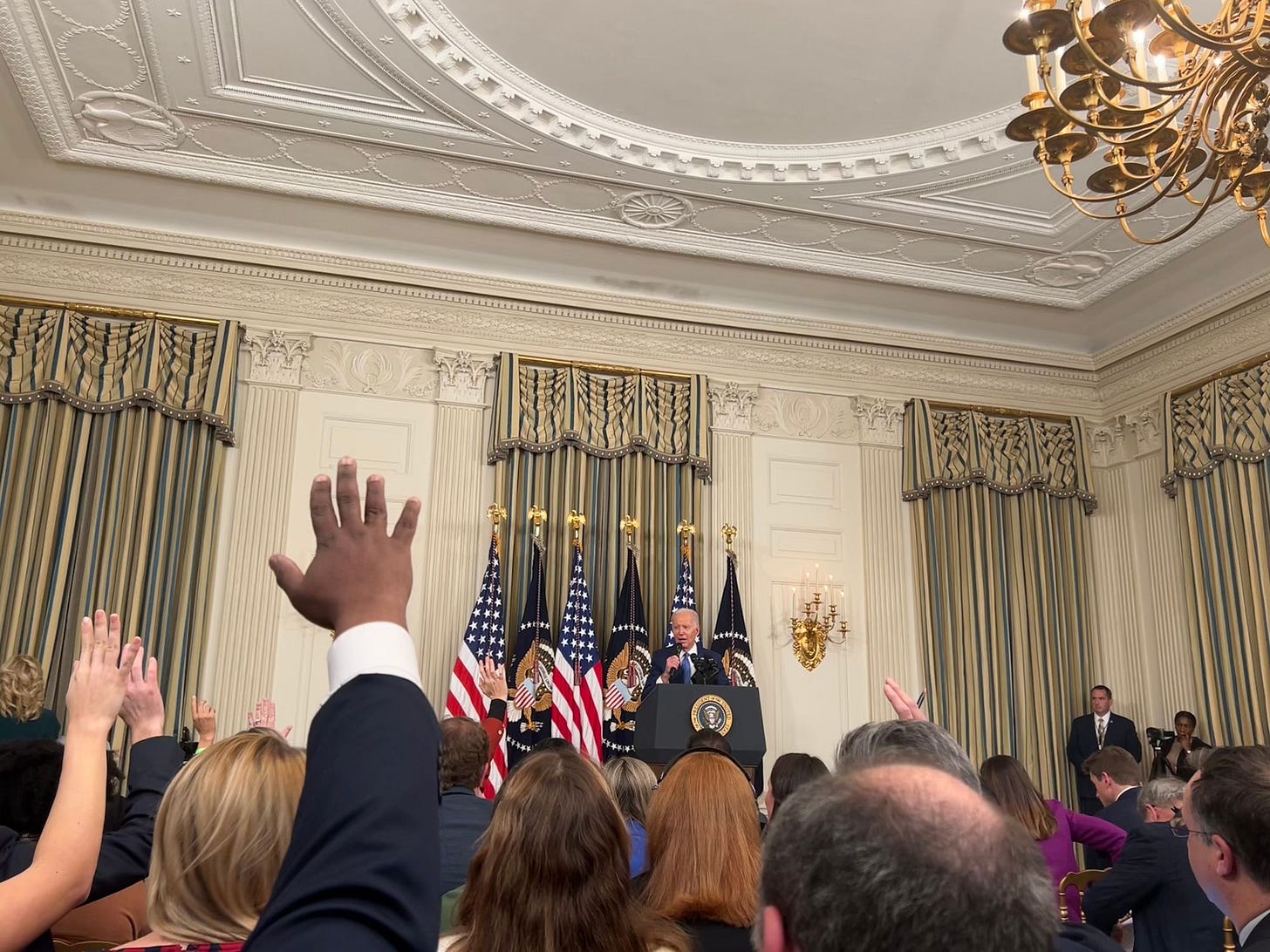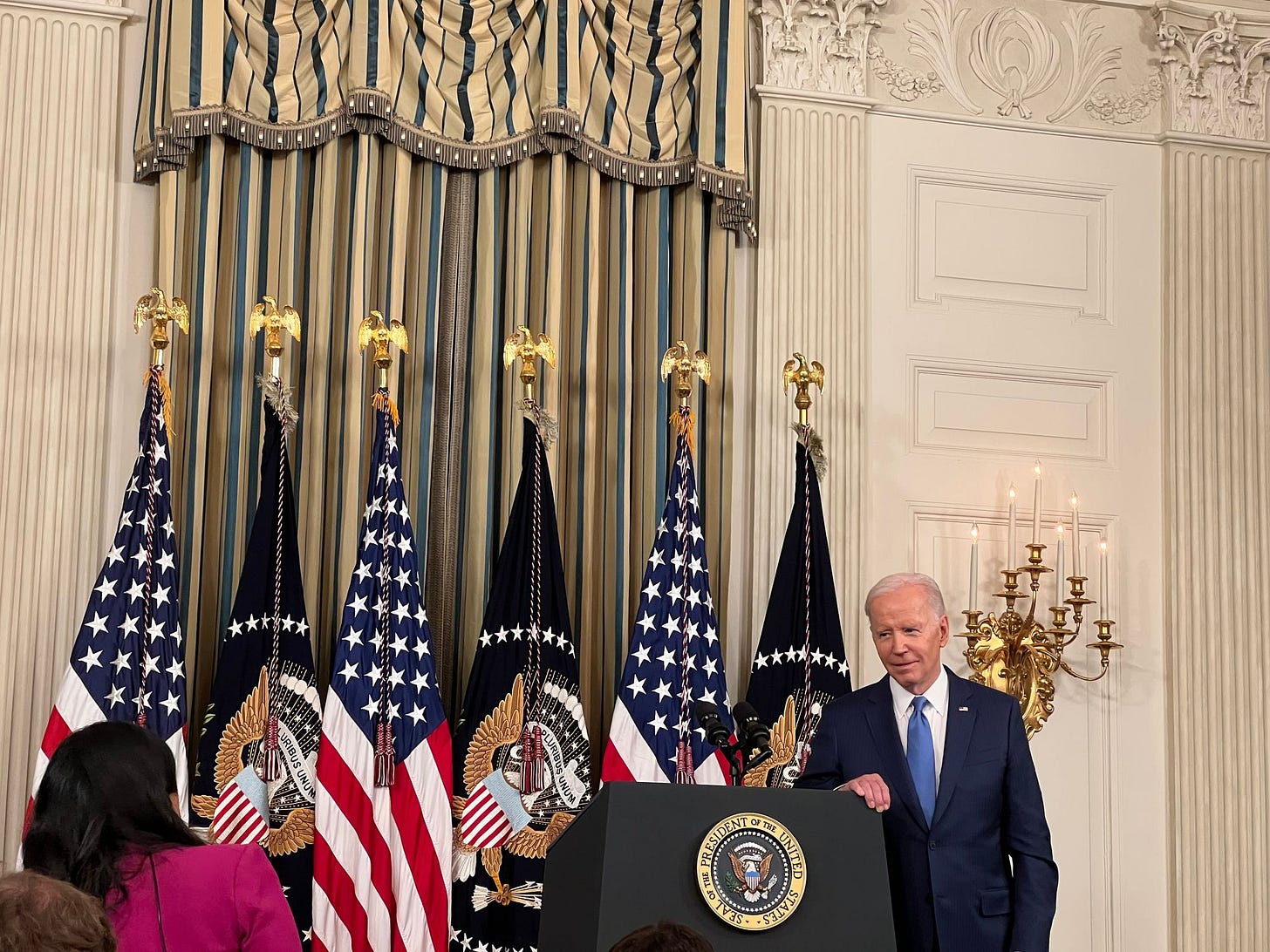Biden defiant after midterms
At his first press conference after the midterms, President Biden looked towards 2024 — and couldn’t help but snipe at the media for underestimating him.
Good morning! It’s Thursday, November 10, 2022. The 2024 elections are 726 days away.
Over the next few days, I’ll be looking at the 2022 election results from plenty of angles. Yesterday, I was at the White House covering President Biden’s post-election press conference — so I want to spend this morning taking you inside the room there and looking at what the midterms mean for Biden.
Plus, keep scrolling for an update on where the midterm results stand.
📣 If this newsletter was forwarded to you, subscribe here. If you want to contribute to support my work, donate here.
“Watch me”: Biden defiant as he looks to 2024 after successful midterms
Joe Biden has long been a man counted out.
Throughout his five decades in public office, there has been no shortage of times when the political poobahs believed his career to be over. They dismissed him in 1972 when, as a 29-year-old county councilman, he launched an underdog bid to unseat a popular two-term senator and former Delaware governor.
Then, he arrived in Washington — only to be brought to the verge of resignation when he received the most tragic news a husband and father can receive.
A plagiarism scandal unraveled his first campaign for the presidency in 1988, followed by a brain aneurysm that almost took his life. His second bid in 2008 ended with a fifth-place finish in Iowa; then, he was made vice president, but treated the entire time as a political sideshow, mocked by White House aides and pushed out of the 2016 campaign by his own boss, after facing his second terrible tragedy.
Biden’s third stab at the presidency was successful, of course, but only after pundits looked past him in the primaries — just waiting for someone to supplant him in the polls — and panned his strategy in the general election. His tenure has been shadowed by his more ubiquitous predecessor and questions about whether he should really run again in 2024.
If there was one message from his post-midterms press conference on Wednesday, it was this: Biden has had it with being underestimated.
Staring out at a sea of the media elite, it took all of one minute for Biden to directly address the expectations that had been set by the journalists before him. “While the press and the pundits [were] predicting a giant red wave, it didn’t happen,” he said.
“And I know you were somewhat miffed by my obsessant optimism, but I felt good during the whole process. I thought we were going to do fine.”
Reeling off statistics suggesting the results will be the best in decades for any Democratic president’s first midterm election, Biden declared: “It was a good day, I think, for democracy. And I think it was a good day for America.” The subtext: It was also a good day for Biden.
After questions swirled for the past two years about whether Biden’s 2020 victory was an aberration, more due to his divisive opponent than to him, Biden is clearly taking 2022 as the ultimate vindication of the oft-critiqued political style he has cultivated over 50 years in public life.
Asked what he plans to do differently in the second half of his term, considering the three-fourths of Americans who told exit pollsters that they are “dissatisfied or angry” about the state of the country, Biden answered: “Nothing.”
He didn’t need to change anything, he insisted; he just needed to inform more people about what he had already done. “The more they know about what we’re doing, the more support there is,” he said, adding later: “So, I’m not going to change anything in any fundamental way.”
Asked for a message to the two-thirds of Americans who say he should not seek a second term in 2024, Biden’s answer was similarly succinct: “Watch me.”
This was Defiant Biden at his finest, a more stubborn version of the president that rarely comes out in public but is well known to his aides behind the scenes. If there is any setting that this Biden emerges, though, it is when he is tangling with reporters at press conferences such as this one. (Perhaps that is why he has held fewer of them than any of his recent predecessors.)
One longtime annoyance of his is when reporters ask multiple questions after being called on. “How come we never hold you guys to the same standards you hold us to?” he cracked when his very first interlocutor did so. (“I’m teasing. I’m teasing. I’m teasing. I’m teasing,” he added quickly.)
The feature of the press conference I found most intriguing was his repeated nods toward young voters, who broke 63%-35% for Democrats on Tuesday, a more favorable margin for the party than any other age group.
There are other demographic groups — Black voters, women, etc. — who also fueled Democrats’ midterm overperformance this week. But the only constituency Biden lavished with gratitude on Wednesday was the youth.
“I especially want to thank the young people of this nation, who — I’m told; I haven’t seen the numbers — voted in historic numbers again — just as they did two years ago,” he said. (Per Tufts University, 27% of 18- to 29-year-olds voted this year, more than in any midterm except 2018, when 31% did.)
Later, just as he did at another speech of his I covered last month, Biden launched into another round of praise for Generation Z. “I’ve never been more optimistic about America’s future than I am today,” he said, “particularly because of all those young people I’ve talked about, 18 to 30. They’re showing up.”
“They’re the best-educated generation in American history, they’re the least prejudiced generation in American history, the most engaged generation in American history, and the most involved.”
Not only were young voters the only demographic he thanked, but the only winner of a midterm race he acknowledged by name was Maxwell Alejandro Frost, the 25-year-old from Florida who became the first member of Generation Z elected to Congress.
Biden said that he called Frost on Tuesday night, explaining: “When he’s president and they say, ‘Joe Biden is out in the outer office,’ I don’t want him to say, ‘Joe who?’”
But, jokes aside, Biden clearly does not plan to hand things off to Frost and other younger faces just yet, despite his 2020 promise to be a “bridge” to the Democratic Party’s next generation of leaders.
Biden’s praise for Generation Z was recognition that youth turnout likely saved Democrats on Tuesday — and that he will need them to stick with him again in 2024, when he said it is his “intention” to run once more. (He said a final decision will come early next year, but don’t be surprised if he drags his feet, as he has done every other time he has thought about running.)
After all, as he prepares to turn 80 later this month, signs of his advanced age were visible on Wednesday. Biden’s voice was hoarse, as he himself acknowledged; his delivery was often flat and strangely unenthusiastic, even when boasting about successes, as he took the somewhat listless tone he has adopted lately when reading off a teleprompter.
Like at several stops on the campaign trail this year, he quickly ditched the formality of the presidential lectern and opted for a handheld mic, which aides reportedly believe makes him “a much more natural speaker.” This allowed him to circle the lectern as he looked across the room and called reporters off of a pre-selected list; occasionally, he stood to the lectern’s side, casually resting one arm on it as his other hand gripped the microphone.
Handheld mic or not, though, his remarks were not free from the verbal stumbles that have long been part of his speeches — but seem to have only increased in frequency. Asked about the war in Ukraine, Biden appeared to momentarily forget the country being invaded, accidentally referring to the Iraqi city of Fallujah.
New York Times reporter David Sanger, who recently produced an HBO documentary on Biden with extensive White House cooperation, had to remind the president that he meant Kherson, the Ukrainian city Russian troops withdrew from just this week.
But the arc of Biden’s long career is a reminder not to dismiss his political survival so quickly. He certainly doesn’t, obviously proud of having defied history and media expectations, while also cognizant of the challenges that lie ahead, as he must convince the generation of his grandchildren to stay on his side once he enters his 80s.
If his press conference is any guide, expect him to use the midterm results — even though his unpopularity was likely still a drag on Democratic candidates, even though candidates kept their distance from him on the trail — to reaffirm the rightness of his approach thus far and to soft-launch a 2024 bid.
There is a clip from the 2020 primaries that has apparently been circulating again among Biden aides after Democrats staved off their expected wipeout on Tuesday. In it, he is sitting with the New York Times editorial board; like on Wednesday, he is being asked about his political future and can’t help but scoff at the media elite for thinking it is over.
“You all...declare me dead,” he says in the clip, “and guess what? I ain’t dead. And I’m not gonna die.”
🗳 Where the midterm results stand
Here’s where things stand as of this morning:
Race for the Senate
After Sen. Ron Johnson (R-WI) was declared the victor in his race on Wednesday, Republicans are now assured 49 seats in the next Senate while Democrats have a lock on 48.
That leaves three seats that will determine who is in the majority:
In Arizona, Democratic Sen. Mark Kelly leads his Republican challenger Blake Masters, 51.4% to 46.5%. Still only 70% of the votes have been counted.
In Nevada, Republican Adam Laxalt is ahead of Democratic Sen. Catherine Cortez Masto, 49.4% to 47.6%. So far, 83% of the votes has been counted.
Finally, in Georgia, officials have declared that the race between Democratic Sen. Raphael Warnock and Republican Herschel Walker will go to a December 6 runoff because neither candidate reached the 50% threshold required in the state.
Whichever party wins at least two of these three remaining races will win control of the Senate.

Race for the House
Per the Associated Press, Republicans have won 207 House seats and Democrats have won 189, with 39 yet to be decided. A number of races were called Wednesday as flipping into Republican hands, four of them in New York, including the defeat of Rep. Sean Patrick Maloney, the chairman of the House Democratic campaign committee.
In all, per Politico, Republicans have flipped 14 Democratic seats; Democrats have flipped five Republican seats.
According to NBC News, Republicans currently led in enough races to win back the House majority — 221 to Democrats’ 214 — although more votes will be counted, of course, so those numbers are not final. NBC projects that Republicans will land at 222 seats in the end, plus or minus seven.
In perhaps the closest race in the country, and one that has garnered plenty of national attention: Democrat Adam Frisch is ahead of Republican Rep. Lauren Boebert, a prominent Trump ally who was expected to win easily, by a mere 64 votes in Colorado’s 3rd district.
Race for the states
Two key gubernatorial contests remain uncalled:
In Arizona, Democrat Katie Hobbs has a razor-thin lead over Republican Kari Lake, 50.34% to 49.6%%, with 70% reporting.
In Nevada, Republican Joe Lombardo has an edge on Democratic Gov. Steve Sisolak, 50.1% to 46.2%, with 83% reporting.
🗓 What your leaders are doing today
All times Eastern. Click on an event’s time to watch or listen to it.
Executive Branch
President Biden will receive his daily intelligence briefing (9:30 am) and deliver remarks at a post-election event hosted by the Democratic National Committee (3 pm). Tonight, Biden will depart for Sharm El-Sheikh, Egypt, where he will attend the COP27 climate change conference later this week.
Vice President Harris will also deliver remarks at the DNC event (3 pm).
White House press secretary Karine Jean-Pierre will be joined by national security adviser Jake Sullivan at her daily press briefing (12:45 pm).
Legislative Branch
The House (12 pm) and Senate (3 pm) will both convene for pro forma sessions, brief meetings which are attended by few members. No legislative business is conducted during such sessions; they are held only to satisfy Congress’ constitutional obligation of meeting at least every three days.
Judicial Branch
The Supreme Court will meet for its weekly conference.
👍 That’s all for today. If you enjoy Wake Up To Politics, it’s always appreciated if you donate to support the newsletter or buy some merch. Or if you tell your friends and family to sign up at wakeuptopolitics.com.
If you have any questions or feedback, feel free to email me: my inbox is always open.
Thanks for waking up to politics! Have a great day.
— Gabe





